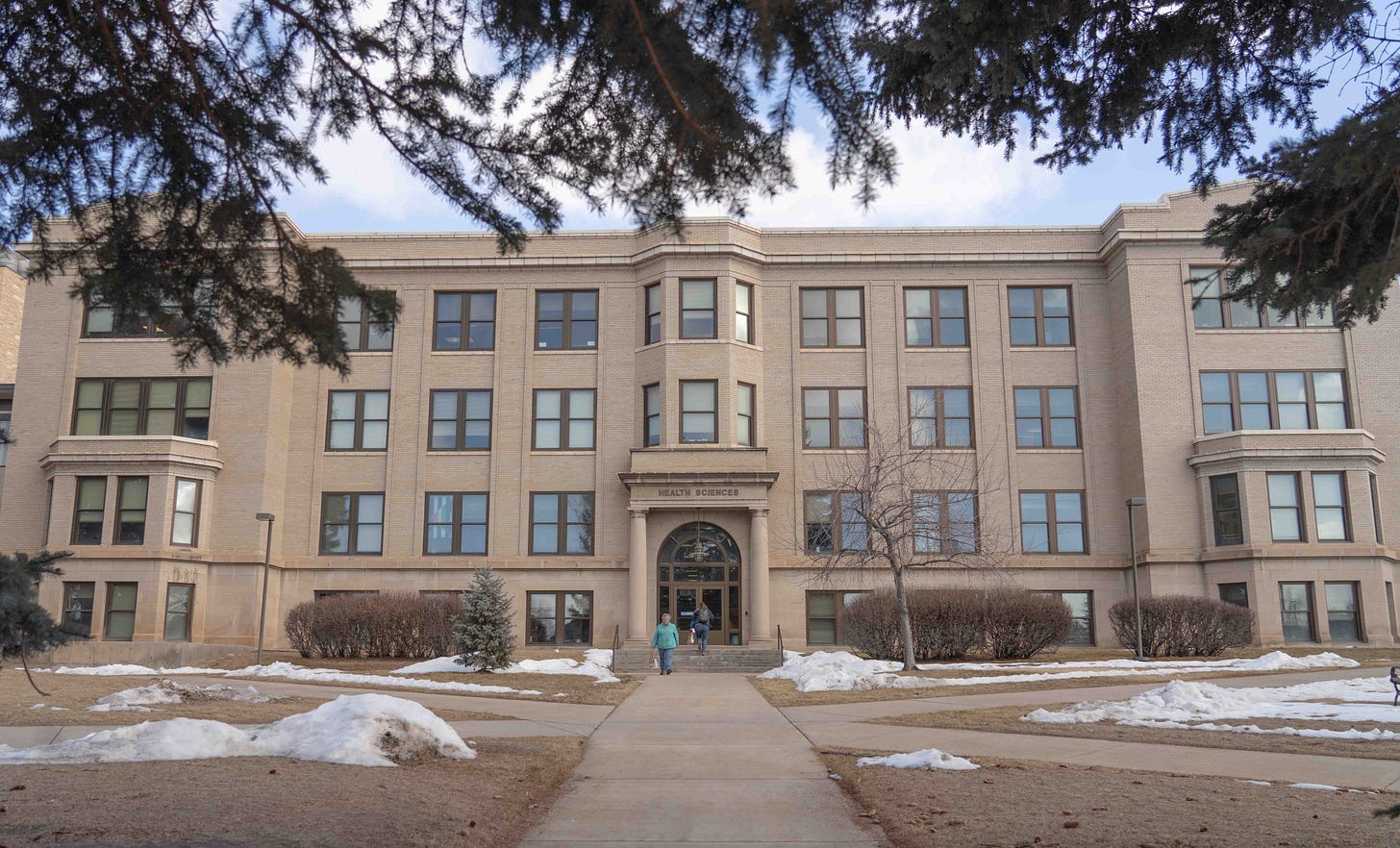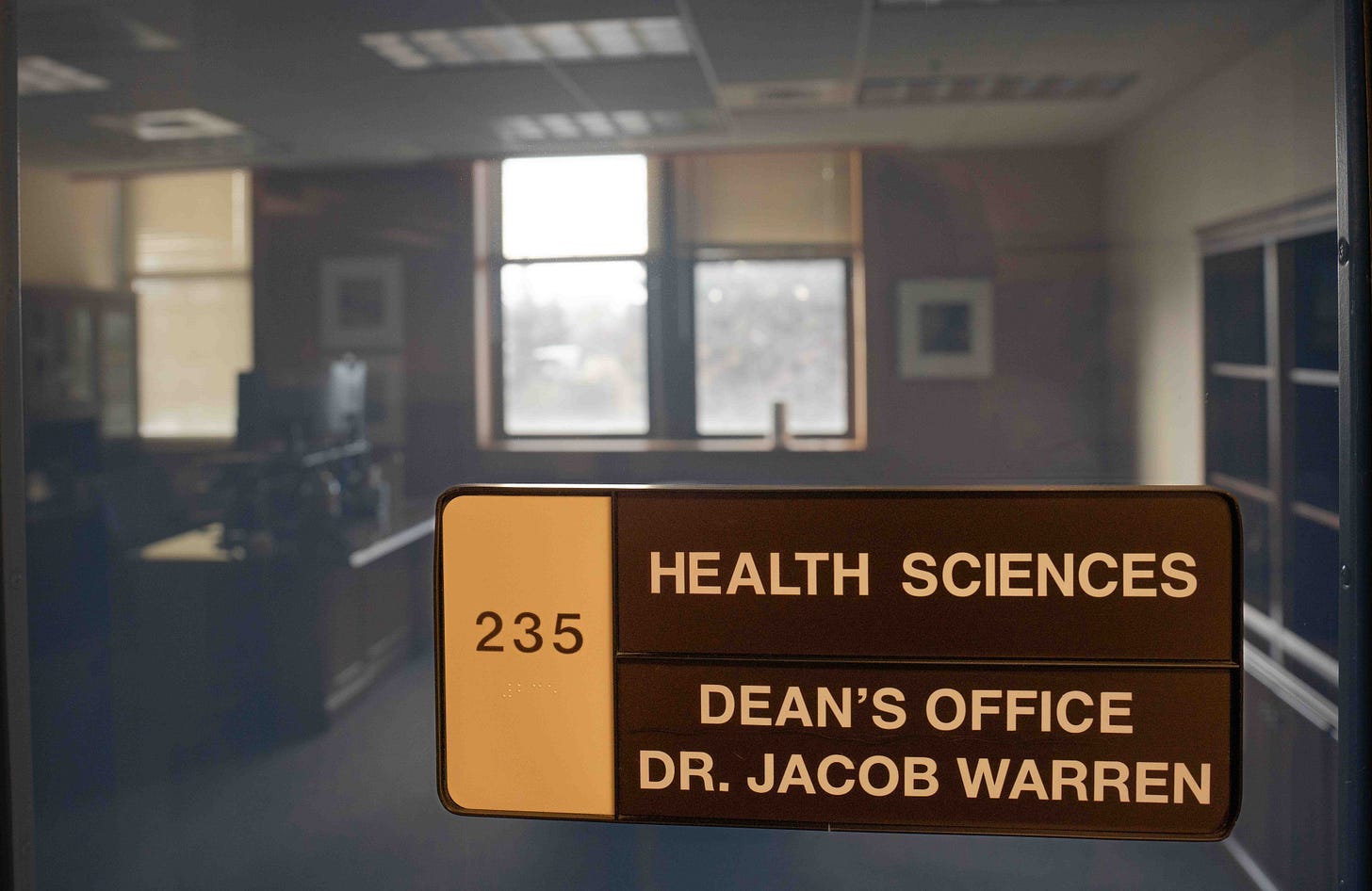University removes Health Sciences Dean Jacob Warren
Faculty had accused him of nepotism and mismanagement; other stakeholders alleged his vision for WIND would be its downfall. The disability community, state lawmakers and funding agencies took notice.

The University of Wyoming has removed Jacob Warren from his leadership position in the College of Health Sciences, capping off several months of sustained public controversy.
The embattled dean had been accused by faculty and other stakeholders of engaging in nepotism to benefit his spouse, losing millions of dollars by allegedly altering grant applications before submission, and inadvertently threatening to unravel the Wyoming Institute for Disabilities (WIND) by removing programs central to its mission.
Until Warren’s removal today, UW administration had voiced strong support for both the dean and his vision for the College of Health Sciences. It’s not clear how much of that vision will remain intact now that Warren is no longer at the helm.
“We determined that this change was in the best interests of the college, the university and the state,” said UW spokesman Chad Baldwin, speaking on behalf of the administration. “We do support Dean Warren’s vision and goals to expand the college’s role in advancing rural health in the state of Wyoming and will work with units of the college to continue development of the vision, alignment of the programs and evaluation of the most productive path forward for the college.”
Elsewhere, administrators thanked Warren for his contributions.
“We appreciate Dr. Warren’s service to the university and the college,” Provost Kevin Carman writes in a message to campus announcing the change of leadership. “He was deeply committed to fulfilling the statewide mission of the college.”
School of Pharmacy Clinical Professor Michelle Hilaire will step in as acting dean, as UW looks for an interim dean among its senior faculty. Eventually, during the fall semester, UW will conduct a national search for the next permanent dean.
Warren’s fraught tenure
Hailing from Mercer University in Georgia, Jacob Warren became dean of the College of Health Sciences during the summer of 2022. For nearly the entirety of his tenure, Warren’s style of leadership and his plans to reorganize the college brought him into frequent conflict with the faculty there.
About three months ago, that long simmering conflict escalated and went public.
In October, a faculty letter invoking the university’s formal dispute resolution process accused the dean of losing more than $10 million in grant funding by altering grant applications before submission and of using his position to benefit his spouse.
In addition, the letter alleged Warren had created an environment where communication was strained and collaborative decision-making was non-existent, and that the dean’s behavior was hurting “employees’ and entire units’ abilities to effectively function, and resulting in financial and talent loss at UW.”
Around the same time, five of the college’s seven division heads took a vote of no confidence — with all five voting heads indicating they had “no confidence” in the dean’s ability to perform his duties or lead the college.
By the end of that day, one of those division leaders, Sandy Root-Elledge, was placed on administrative leave and told she could resign or be removed. Root-Elledge had worked in the Wyoming Institute for Disabilities for nearly two decades, leading WIND as its director for the last seven years.
The following day, another division leader was given the same ultimatum. Brant Schumaker had served as director of the WWAMI medical education program since 2021. Both Root-Elledge and Schumaker resigned the following Monday.
They were neither the first nor the last to leave. During Warren’s reign, WIND has lost one out of every three employees to resignations.
Amid all of this, the university administration said it stood by its dean.
“The president and the provost have considered and will continue to be open to hearing from faculty and staff members who disagree, but the university’s administration supports actions taken by Dean Warren and his vision for the future of the college,” Baldwin said in October. “Change can be difficult, but Dean Warren has the backing of UW’s administration.”

Retired UW professor and former faculty senate chair Donal O’Toole decried the administration’s stance in an opinion column for WyoFile. He lambasted the university for allowing the ouster of Root-Elledge, “a successful, effective and popular administrator” who had launched Project ECHO and other successful programs while securing millions in funding.
“The impulse for UW’s upper administrators to circle the wagons and support one of their own is hardly unique, but it is unhealthy,” O’Toole writes in his column. “Such opacity and apparent cronyism breeds suspicion, erodes faith in the institution from the inside out, enforces deference, discourages the kind of collaboration and intellectual risk-taking that underpin successful research institutions, and destroys morale and esprit de corps.”
No justice, no peace
In three successive UW Board of Trustees meetings, the trustees heard from College of Health insiders outraged by Warren’s behavior, leadership, or lack of communication.
In November, medical education students reported feeling uncertain about the future of their traditionally prestigious program. In December, one of the faculty letter’s co-authors described to trustees an environment of “fear and distrust” enveloping a UW unit where communication and ideas once flowed more freely. Yesterday, during the board’s January meeting, the chair of the WIND consumer advisory council alleged the dean’s plans regarding WIND were threatening its future.
Outsiders took notice, too.
When UW administrators, including Warren, appeared before the Wyoming Legislature’s Joint Appropriations Committee to defend UW’s budget requests, lawmakers took the opportunity to grill both Warren and President Ed Seidel about the situation in Health Sciences.
“I think the perception perhaps on campus — not just with the students but with other stakeholders who receive services — is that if you disagree, you’re gone,” Rep. Lloyd Larsen (HD-54) said. “You tell us all the time how important it is to be able to have great conversations and disagree without feeling jeopardized. And I’m not sure that we’ve done that real well.”
Both yesterday and today, the UW Board of Trustees’ scheduled executive sessions ran long. Warren’s removal was announced internally, to faculty, around midday, and announced publicly this afternoon.
While Warren’s removal has implications for the future of WIND, it does not chart a specific course. WIND is still missing one-third of its staff and has yet to replace its lost director. It’s also not clear whether WIND will get to keep the programs it has been so concerned about losing.
“We will continue our evaluation of WIND and its path forward over the coming weeks,” Baldwin said. “We will continue to evaluate the most appropriate alignment of ECHO and Telehealth.”




The removal of Dean Warren, albeit long overdue, does not resolve this matter. The University’s problems run much deeper than just a single individual. This cataclysmic event would have been avoided had there been adequate safeguards and accountability measures in place. Until these inadequacies are rectified, the University will have difficulty securing and preserving talent, funding, and community support.
Moreover, the actions of the Provost and President must also now come under intense scrutiny because this disaster was facilitated by their leadership, or lack thereof. More safeguards and accountability at all levels are necessary to foster student and faculty trust, the strong rebuilding of the WIND and WWAMI programs, and prevent repetition of this chaos in the future.
Finally, the University owes a public apology to both Ms. Root-Elledge and Dr. Schumaker, true champions of the University and the state, who were unjustly forced to sacrifice their long and distinguished careers simply because they did the right thing trying to protect the University from certain disaster. The state along with the faculty and staff of the University should never forget their sacrifice – thank you both for having the strength and courage to fight for the University when the Provost, President and Trustee did not. You both are the true embodiment of the Cowboy spirit!
The above comment says it all…the University is a mess.